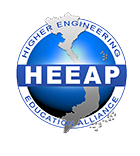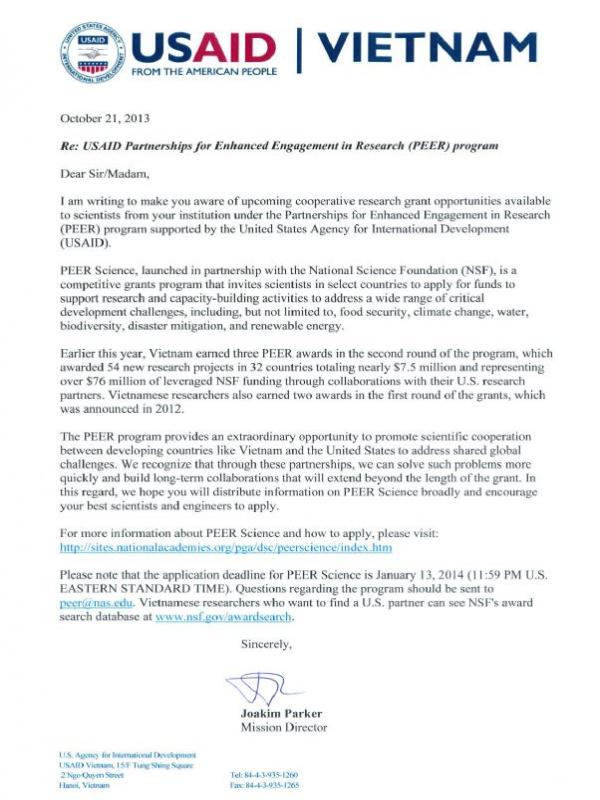PROGRAM BACKGROUND AND OBJECTIVES: The United States Agency for International Development (USAID) is exploring new opportunities to use science and technology to meet the world’s development challenges. As part of its science and technology strategy, USAID is supporting various mechanisms to leverage the investments that other U.S. government agencies make in scientific research and training. In this context, USAID, in partnership with the National Science Foundation (NSF), have launched Partnerships for Enhanced Engagement in Research (PEER) Science. PEER Science is a competitive grants program that invites scientists in developing countries to apply for funds to support research and capacity-building activities on topics of importance to USAID and conducted in partnership with their NSF-funded collaborators. Areas in which both NSF and USAID have strong mutual interests include, but are not limited to, the following:
- Food security topics such as agricultural development, fisheries, and plant genomics
- Climate change impacts such as water sustainability, hydrology, ocean acidification, climate process and modeling, and environmental engineering
- Other development topics including disaster mitigation, biodiversity, water, and renewable energy
TYPES OF ACTIVITIES SUPPORTED: Examples of the types of activities that may be funded under PEER Science include education and training; technology dissemination; application and adaptation of new technologies; support for students, postdoctoral associates, and researchers; international travel; communications; equipment, materials, and supplies for developing country institutions; and research networks. For examples of the types of activities supported, prospective applicants are strongly encouraged to consult the list of previously funded projects in Cycle 1, Cycle 2, and the PEER-PIRE 2012 cycle.
SELECTION CRITERIA: Proposals will be reviewed by a panel of experts in the relevant disciplines to be convened by the National Academies in collaboration with USAID. Proposals will be evaluated primarily on developmental impacts, including the following:
- Relevance to USAID’s global and country-specific programmatic interests
- Technical merit and scientific feasibility
- PI’s demonstrated ability to achieve proposed project goals
- Strength of the international collaboration and potential for continued interaction after the proposed project ends
- Consistency of the proposed project with the U.S. partner’s NSF-funded award
- Other developing country scientists involved in project (for example, students, postdoctoral and other beginning researchers, and/or female participants)
- Potential to build sustained capacity at the applicant’s institution (for example, through acquisition of new equipment, development of new courses, or capacity building of research personnel and students)
- Prospect for broader impact and dissemination, for example through producing research results that inform local policies or programmatic activities or by accelerating progress towards innovative solutions to global development challenges.
- Cost-effectiveness of proposed budget
- Administrative and financial management capabilities of the applicant’s institution
Following completion of the panel review process, proposals deemed competitive will be sent to the USAID missions in their respective countries for comments. Competitive proposals that best fit the USAID missions’ priorities in each country will have the best prospects for funding. Therefore, it is important that proposals clearly explain how the proposed work aligns with USAID’s priorities in the relevant country or region. For more information on USAID country and regional priorities, please consult the USAID Web site.
The NSF award of the U.S. partner designated in the PEER Science proposal must be active over the requested duration of the PEER Science project to ensure that both sides have resources available to support their collaboration. In order for a PEER Science proposal to be considered eligible for review, the requested duration of the proposed project may not extend more than twelve months beyond the official termination date of the U.S. partner’s NSF award that is effective at the time the PEER Science proposal is submitted. PEER Science proposals not complying with this requirement regarding allowable duration will be rejected without further review. Please review the Frequently Asked Questions section of the program Web site for additional details, or e-mail peer@nas.edu with other eligibility questions.
AWARD INFORMATION: Budget requests should be developed commensurate with the support needed to achieve the project goals. Most projects are anticipated to run for one to three years, with release of each funding increment contingent on the project meeting annual financial and technical reporting requirements. The number of PEER Science awards is subject to the availability of funds.
Single institution awards are anticipated to range in size from $30,000 to $60,000 per year for one to three years. A few larger and more complex projects (those involving multiple institutions and/or multiple countries, with one of them serving as the lead) may receive up to $110,000 per year for up to three years. Applicants whose funding requests do not fit within these parameters are encouraged to contact PEER Science staff at the National Academies (peer@nas.edu) before preparing their proposals. When preparing their PEER Science proposal budgets, applicants should keep in mind that requested funds may be used only to support costs for developing country researchers and institutions.
CONTACT INFORMATION: PEER Science is being implemented by the National Academies, which will manage the proposal review process and disburse and monitor grants awarded. Beyond the current program cycle, it is expected that solicitations for PEER Science will be issued at least annually, with details to be posted at http://www.nationalacademies.org/peerscience. For further information, please contact the program staff atpeer@nas.edu.
DETAILED INFORMATION:
http://sites.nationalacademies.org/PGA/dsc/PEERscience/index.htm
PROPOSAL DEADLINE: JANUARY 13, 2014, 11:59 PM U.S. EASTERN STANDARD TIME


